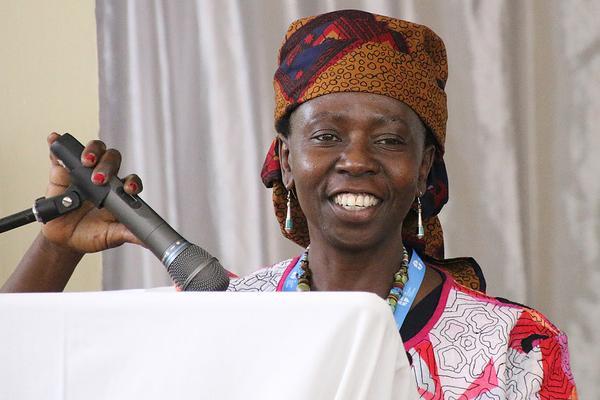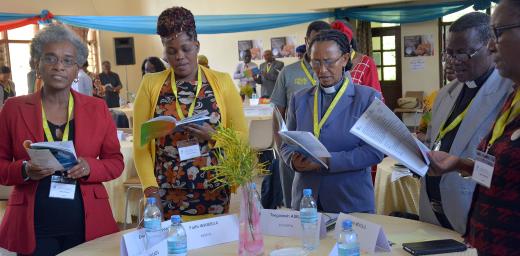Persist in putting faith into action, Kanyoro urges Lutheran churches

Global Fund for Women president, Dr Musimbi Kanyoro, addresses Lutheran church delegates at the May 2015 African region consultation and 60th anniversary gathering in Moshi, Tanzania. Photo: LWF/Tsion Alemayehu
Violence against women is alarming, congregations can do more
MOSHI, Tanzania/GENEVA, 2 June 2015 (LWI) - “Are we as churches sometimes unable to speak about violence against women and girls because we experience it and practice it?” This was one of the questions posed by Dr Musimbi Kanyoro, chief executive officer and president of the US-based Global Fund for Women, when she addressed African Lutheran church leaders meeting in Moshi, Tanzania, to celebrate 60 years since the first pan-African Lutheran gathering.
Kanyoro, who in the late 1980s and 1990s coordinated The Lutheran World Federation (LWF) Women in Church and Society desk, commended the LWF for its courage in advocating and acting for change in society and in the churches. “Each one of us here will have some experience of a public action, a theological or social issue that you celebrate,” she said, and mentioned advocacy and intervention against apartheid, political oppression and repression, displaced people, and HIV and AIDS among others.
“Issues that raise public concern will not go away,” Kanyoro said in her presentation on justification and public responsibility. She encouraged churches in the Lutheran communion to persist in putting their faith into action even when progress is not forthcoming.
Kanyoro affirmed LWF’s role in enabling churches to talk together about an inclusive church for men and women, the clergy and laity. “We saw consistently how churches learn from each other and also care for their bilateral and multilateral relationships,” she said, referring to the issue of women’s ordination in several LWF churches.
“It took a while for change to happen, but once started our togetherness as churches in communion hastened and scaled it rapidly,” she noted, and cited cases of Lutheran women ordinations in the United States, Finland, Namibia and Tanzania, among several other countries.
Violence against women is pervasive
Kanyoro commended the LWF and its churches for significant efforts in engaging with the issue of violence against women both in church and society. However, she argued, much more needs to be done. “Violence against women and girls in the world today is so pervasive that it is a shame to society, and we in the church have no excuse for not making it our business,” she emphasized.
Global indicators on the prevalence and impact of such violence show that “the most dangerous place for a woman is in her own home,” at the hands of an intimate male partner, Kanyoro said. She described the facts as “harrowing,” with “more than one in three women globally having been subjected to physical and/or sexual violence.” The personal tragedy, human suffering, enormous social and economic costs of such violence have ripple effects throughout society.
Equally alarming is the number of women who are subjected to human trafficking for forced labor worldwide. Citing statistics from United Nations Women, Kanyoro said women and girls represent 55 per cent of the estimated 20.9 million people trafficked for forced labor worldwide. The same group accounts for 98 percent of the estimated 4.5 million people forced into sexual exploitation. This is in addition to other forms of violence such as the most extreme—femicide—the murder of women and girls simply because they are female.
Faith calls churches to action
Kanyoro argued that churches and their congregations “have the expertise to understand the pain in our communities,” and should thus lead in correcting gender inequalities, respecting human rights of all people without exception, preventing conflicts and wars, ending violence, and creating a fair and just world.
Faith without action does not give people hope, Kanyoro said. She encouraged the over 200 church delegates at the conference to continue “to use the pulpit to teach what our communities should look like” and help people to see the image of God in each suffering person.
“My hope is that we will never tire of our responsibility to be present and act in the moment to address the issues of our time. We are justified by faith and called back to our responsibility,” she added.
(Afram Pete, regional coordinator of the the African Lutheran Communication and Information Network (ALCINET) contributed to this article.)



